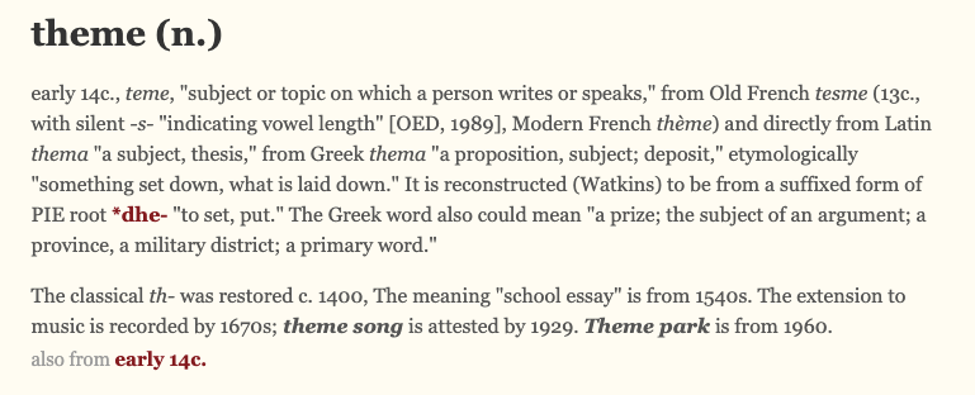A MiddleWeb Blog

 The middle school and high school ELA teachers in my district have been doing exponentially more vertical alignment this year, and frankly I love it. (I also love the phrase itself. Isn’t it pretty: vertical alignment? Doesn’t it sound all science-y and like we know what we’re doing?)
The middle school and high school ELA teachers in my district have been doing exponentially more vertical alignment this year, and frankly I love it. (I also love the phrase itself. Isn’t it pretty: vertical alignment? Doesn’t it sound all science-y and like we know what we’re doing?)
And one of the things that came up pretty quickly in my mind is that there are some education terms we think we all know, but in fact are teaching in ways that shift and change from year to year.
You can probably name some of these off the top of your head, ELA peeps: main idea comes to mind pretty quickly. But the one that’s been sticking in my craw recently is theme.
Theme as a concept is as old as the Greeks and possibly older – take a look at this screenshot from the incomparable Online Etymology Dictionary, which is to me what TikTok is to my students. (My favorite fun fact below is the one about the theme park.)
 Looking this up elucidated that the tension is many hundreds of years old: even in the 14th century, apparently, folks can’t figure out if a theme is a “topic” or an “argument,” a “subject” or a “proposition.” Today, a cursory Google search brings up hundreds of YouTube videos, posts, and articles that equate theme with moral, message, main idea, central idea.
Looking this up elucidated that the tension is many hundreds of years old: even in the 14th century, apparently, folks can’t figure out if a theme is a “topic” or an “argument,” a “subject” or a “proposition.” Today, a cursory Google search brings up hundreds of YouTube videos, posts, and articles that equate theme with moral, message, main idea, central idea.
In this old blog post from Doug Lemov, the author of Teach Like a Champion, we might get some idea as to why these conflations persist. (Disclosure: I had some opinions about Mr. Lemov’s book when it first came out that have not really changed.) Mr. Lemov writes:
The tweak I’d like to add…[is] the observation that a theme cannot be a single word. “Justice” is not a theme. A theme could be about justice—how it is hard to come by when people dehumanize each other, for example, or even “man’s inhumanity to man,” which I remember learning was an all-time most important theme in high school. A theme also should reflect on a conflict or an argument and usually both. This is because all literature has a problem and/or conflict of some sort and its resolution is why we write books.
First up: all literature does not have a conflict or an argument. This is a deeply limited, Western-centric way of looking at literature. East Asian and African stories often involve beautiful ideas about universal themes that have no conflict at all. Never mind poetry! (Can you imagine a world in which James Wright’s A Blessing – one of the loveliest reflections on pure grace in the world – had the tone of ‘how to replace a broken carburetor’?)
However, many educators want to define ‘theme’ as being about making an argument, solving a conflict, resolving a problem. These can all be proved or disproved. These all can be examined, analyzed, measured, predicted, controlled and replicated.
Theme can, in other words, be taught to students as a discrete item that is testable. Good news for those who believe that the success of education rests on whether it can pass a test. From this perspective, of course a “theme” has to be more than one word. How are you going to identify, prove, or disprove a theme otherwise?
The “testable theme” also provides security for educators in a wider sense: it can serve as a vehicle for black-and-white ethical or moral statements. This is exactly why educators often still can’t distinguish between a “theme” and a “moral”: we want our themes to be morals. We want the clear-cut, unambiguous answers to life’s persistent questions.
Life is more complicated than “right and wrong”
We can absolutely present our students with our honest beliefs, our societal priorities, and our convictions about the characteristics of a flourishing life. We can, and should, teach them how to recognize those beliefs and convictions in our literature. But to train our students to evaluate literature, or their own thinking, as “right” or “wrong” by forcing theme into a definitive, subject/predicate sentence? Life does not work this way, and we should not pretend to our students that it does.
I would encourage educators to move beyond their fear in this regard. I would argue that the real purpose of literature is not to resolve the big ideas in our world, but simply to explore them. To boil theme down into a testable statement is to compress the wild, wonderful world of literature into a parking meter. This is far less than useful to our students, especially in the fraught and confusing times we find ourselves in – and it is far less than they deserve.
Theme should be one word, and one word only: a word containing multitudes.
I feel that if Rilke was an ELA teacher, he would agree with me:
Be patient toward all that is unsolved in your heart and try to love the questions themselves, like locked rooms and like books that are now written in a very foreign tongue. Do not now seek the answers, which cannot be given you because you would not be able to live them. And the point is, to live everything. Live the questions now. Perhaps you will then gradually, without noticing it, live along some distant day into the answer. (from Letters to a Young Poet)








